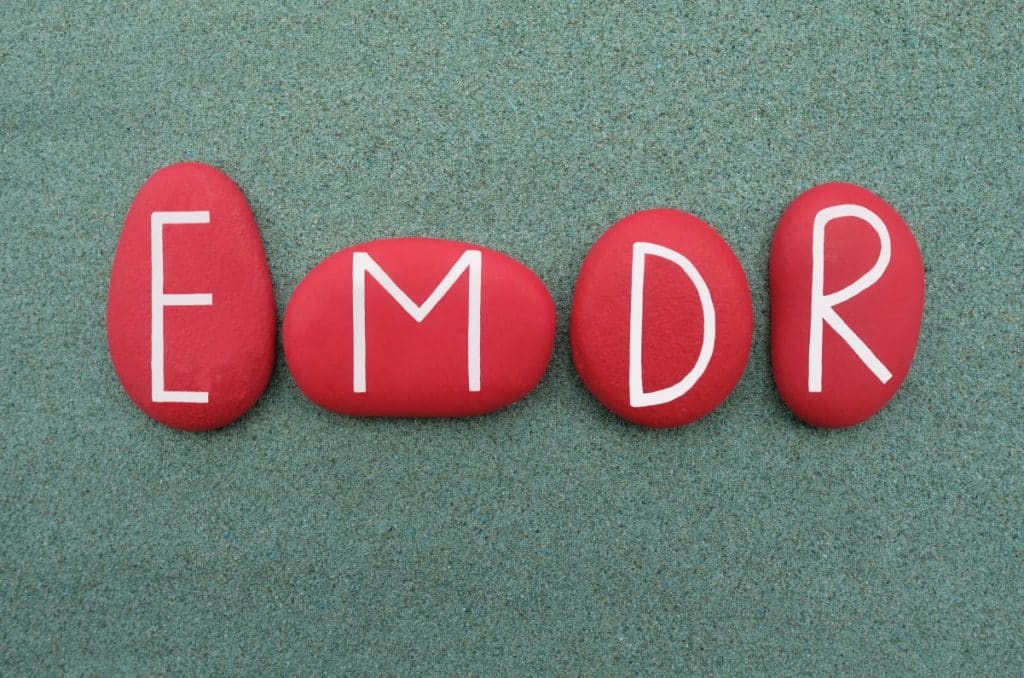When Amy Rinehart began working as an EMDR therapist at The Bluffs Addiction Campuses, she discovered what many in addiction treatment have long suspected: trauma and addiction are deeply intertwined. Last year alone, she treated over 300 patients using Eye Movement Desensitization and Reprocessing therapy, helping them untangle the complex relationship between past wounds and present struggles with substance use.
“Addiction and trauma are intertwined, they exist in the brain and alarm bells are going off,” Rinehart explains. “Where the trauma lives, the trauma has no sense of time. The limbic system doesn’t care about time, and memories are stored in the limbic system through the hippocampus into the area where other memories are stored.”
Understanding EMDR
EMDR, developed by Francine Shapiro in 1989, represents a fundamentally different approach to trauma therapy. Unlike traditional talk therapy, EMDR operates as brain-based psychotherapy that taps into the body’s natural healing mechanisms.
“We all have an innate ability within us for healing,” Rinehart says. “EMDR gives our natural healing system a jump start. If you were to break a bone, this is the psychological equivalent.”
The therapy gets its name from bilateral stimulation—typically eye movements that activate both sides of the brain. This dual attention process helps “scramble” areas where the brain processes overwhelming experiences, allowing patients to heal without having to verbalize traumatic details.
“It’s mostly about internal processing, which is great for those uncomfortable with verbalizing,” Rinehart notes. “You don’t have to be afraid to say things because you don’t have to say the details of the trauma.”
How EMDR Works in Addiction Treatment
The current working memory theory explains why EMDR proves effective for many individuals struggling with both trauma and addiction. When someone recalls a traumatic memory, it activates intense emotional responses. The bilateral stimulation used in EMDR helps deactivate the amygdala and calm the nervous system.

“If I pull up a trauma memory into working memory, it causes pain. It’s tied into strong emotions,” Rinehart explains. “Then we start bilateral stimulation, which differentiates it from talk therapy. We are untying those memories from the pain.”
This approach proves particularly valuable in addiction treatment because it addresses root causes rather than just symptoms. Many patients enter rehab with underlying trauma that contributed to their substance use, making EMDR an essential component of comprehensive care.
“Childhood trauma is often the root cause, so healing is focused on those experiences,” Rinehart says. “All treatment plans are very individualized.”
Integration with Comprehensive Care
At The Bluffs, EMDR doesn’t operate in isolation. Patients receive referrals for EMDR therapy beginning at intake and continuing through detox, with the therapy integrated alongside other evidence-based treatments.
“Rehab is the perfect place to start work on these issues, especially at our center,” Rinehart says. “It’s integrated therapy, so it works in conjunction with other therapies.”
This comprehensive approach recognizes that healing from addiction requires addressing multiple aspects of a person’s experience. EMDR’s three-pronged approach—addressing past, present and future—aligns perfectly with the holistic treatment philosophy that guides care at The Bluffs.
Beyond Trauma: EMDR’s Broader Applications
While EMDR gained recognition for treating trauma, its applications extend beyond post-traumatic stress disorder. The therapy can address various mental health disorders and even serve as performance enhancement for individuals working toward specific goals.
Veterans represent one population that particularly benefits from EMDR therapy, though Rinehart notes that “it’s not always the combat trauma that needs the work.” Many veterans carry multiple traumas from various life experiences, making EMDR’s targeted approach especially valuable.
“This is highly targeted, trauma-focused care, and it’s targeted for patients who have a strong connection between trauma and addiction to help untie those aspects,” she explains.
The Science Behind Healing
Rinehart acknowledges that while EMDR shows consistent results, the complete mechanisms behind its effectiveness remain partly mysterious.
“How do many useful therapies work?” Rinehart said. “We really don’t know exactly, which is interesting.”
What remains clear is that EMDR provides a unique pathway to healing that doesn’t require extensive verbal processing of traumatic experiences. This quality makes it accessible to individuals who might struggle with traditional therapy approaches.
The therapy recognizes that psychological wounds deserve the same attention as physical injuries. Just as medical professionals expect broken bones to heal with proper treatment, EMDR operates on the principle that psychological trauma can heal when given appropriate therapeutic intervention.
Finding Hope in Recovery
For individuals struggling with addiction, particularly those with trauma histories, EMDR offers hope for addressing root causes rather than just managing symptoms. The therapy’s integration into comprehensive addiction treatment programs like those at The Bluffs provides patients with tools to heal on multiple levels.
The connection between trauma and addiction doesn’t have to remain permanent. Through targeted therapies like EMDR, combined with medical detox, residential treatment and ongoing support, individuals can break free from cycles of pain and substance use.
Recovery becomes possible when treatment addresses the whole person—not just the addiction, but the underlying experiences that contributed to it. EMDR represents one powerful tool in this comprehensive approach to healing.
If you or someone you care about is struggling with addiction and trauma, professional help is available. The Bluffs Addiction Campuses offers comprehensive treatment including EMDR therapy as part of individualized care plans. Call today to speak with our admissions team about how we can support your journey to recovery.








